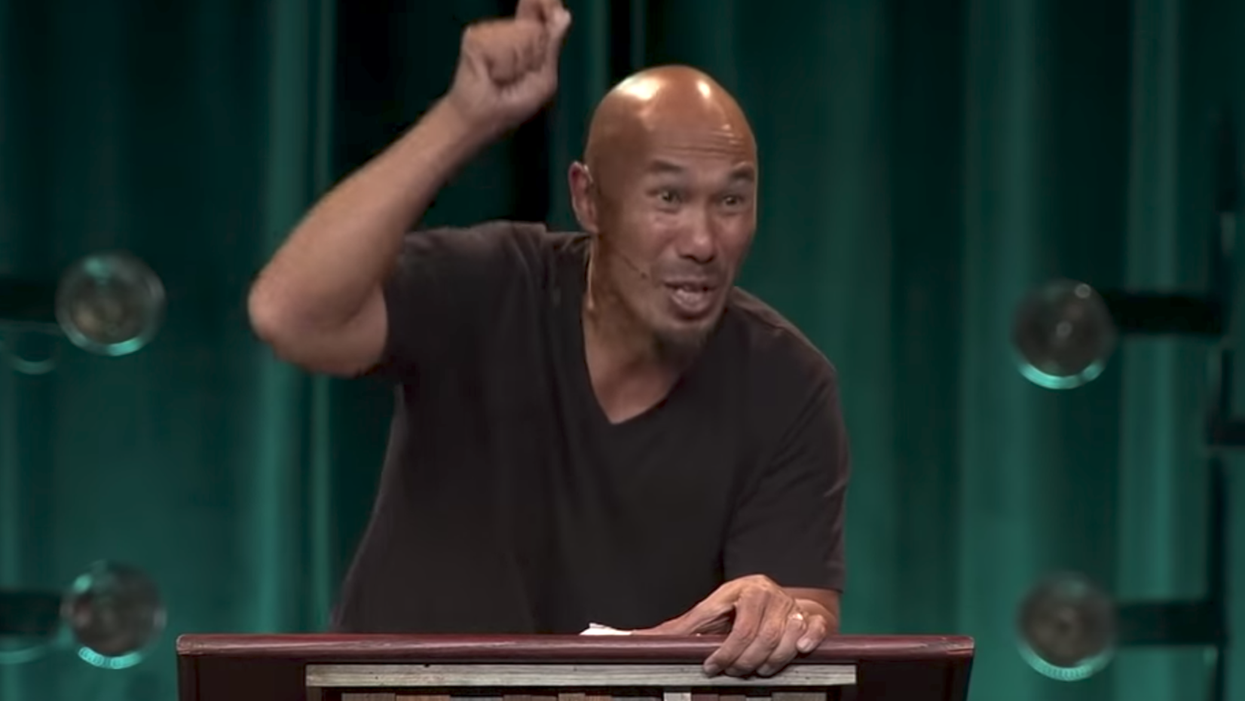
Image source: YouTube video screenshot

Do we want to effect change or just receive validation?
Francis Chan is a Christian author and former pastor. He's quite popular, with several New York Times best-sellers on his resume.
He recently spoke at a conference called The Send in Orlando, Florida. The conference featured some other speakers who are associated with the prosperity gospel and controversial faith healing beliefs, such as Benny Hinn and Todd White.
Chan was the headline speaker at the event, and took some photos with some of these Christian leaders with beliefs Chan believes are incorrect or damaging to the faith.
So, Chan was criticized. How could he allow himself to be associated with false teachers and prosperity pastors who lead people astray from true, biblical Christianity?
Chan's response to his critics should motivate all his critics to evaluate their own application of biblical teaching, and lead us to honestly evaluate how we interact with others in the world with regard to religion, politics, or any other ideological areas.
"I am asked to speak at approximately 500 events a year. I decline approximately 90% of the requests. Often times, I decline because other speakers will be at the event who believe almost exactly what I believe," Chan wrote on his website. "My reasoning is that it may be a waste of Kingdom resources for all of us to be there, speaking largely to people who already agree with us. It seems more effective to speak where there is less Bible teaching."
"I recognize, now more than ever, that sometimes my participation can give the impression that I align with every other speaker at the event," Chan wrote later in the statement. "I'm not sure what to do about that other than to tell you that I don't. Unless the elders of my church direct me differently, I will continue to be found preaching in venues with those I disagree."
There are a couple of key quotes from Chan's statement that I want to focus on: "It may be a waste...speaking largely to people who already agree with us" and "I will continue to be found preaching in venues with those I disagree."
Chan's faith in the Gospel of Jesus Christ as revealed in the Bible is so important to him that his priority is trying to influence those who don't believe in it, rather than simply reaffirming people who already do. He believes that changing the hearts of his ideological opponents will effect greater change than speaking to crowds who will only nod in agreement with everything he says.
There is a lesson here for us in religion (to boldly share our faith with nonbelievers, and not just huddle up within our agreeable faith echo chambers) and also for how we address political issues in our increasingly divided society.
We like to talk to people we agree with, because generally, we don't like being argued with and criticized, and we like when people think we're right. While it's okay, and even necessary, to have support systems of people who share your beliefs, we have to venture boldly, and regularly, outside those support systems to engage the opposition if we believe our views really can help others.
This column will be published on a site that is mostly read by conservatives. We seek to provide accurate news, thoughtful opinions and smart analysis from a conservative perspective and for a conservative audience. I believe that to be a useful service, but we also have to acknowledge the limitations of it and take it upon ourselves to engage in good faith with people on the other side of the spectrum, or we will never see any progress.
Consider these recent comments from our own Glenn Beck to Fox News' Sean Hannity:
"If the Republicans don't win in this next election, I think we are officially at the end of the country as we know it. We may not survive even if we win, but we definitely don't if the Republicans lose with Donald Trump."
You may or may not agree with the stakes as Beck lays them out there, but if you believe, on any level, that the well-being of America depends on it adhering to conservative political principles, how can you justify never attempting to reason with or explain the merits of your position to someone with liberal political beliefs?
By all means, please continue to visit our site and consume the content we produce from a conservative perspective. But also, seek opportunities to have conversations with those who disagree with you about what you believe and why you believe it.
Too much of the dialogue between conservatives and liberals, particularly online, consists of one side trying to mock or insult the other side. Too much campaigning is about "firing up the base" instead of spreading ideas and changing minds. What is accomplished by alienating those on the other side? Is the goal division, or is the goal change?
The goal is attract. To explain. To influence. To persuade. This is a union, not a competitive sport. The nation is being diminished by this growing divide, by this political pendulum where each side swings further to the extremes. Sometimes you win, sometimes they win; but what is the cost? It must always be paid in the next election cycle.
Let's choose a different way. Let's love those who disagree with us enough to have real, civilized conversations with them about the issues that shape our future.
This is not the easy way. I'm not naive enough to think that this approach will always be received with kindness or appreciation. But that's not the point. It's not about what "they" do. Things will only get worse if no one decides to be better. Let's be the ones to do that.